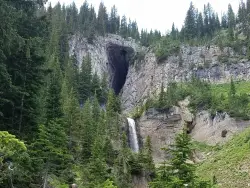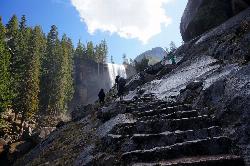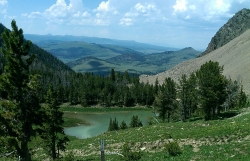Backpacking
Are you ready to escape the city, unplug from technology, and discover the beauty of nature? Backpacking in the great outdoors offers the perfect opportunity to reconnect with the earth and yourself. Whether you're a seasoned adventurer or a first-time backpacker, the thrill of exploring new trails, camping under the stars, and immersing yourself in the wilderness is unmatched.
There are varieties of ways to backpack and people that will swear that each way is the only real way but, whether you're going ultralight backpacking with only most essential items, packing light with all the latest weight-saving technology, or just carrying your normal camping equipment divided between friends. Simply put, backpacking in the outdoor sense is hiking with everything you need to camp.
The backpacking trail options are nearly endless! From the lush forests of the Pacific Northwest to the rugged mountains of the Appalachians, the world is your playground. Whether you're seeking a peaceful retreat in the countryside or an adrenaline-fueled trek through the wilderness, there's a backpacking destination for every preference.
Backpacking allows you to connect with nature and disconnect from the distractions of modern life that few other things can. Once you get beyond point in the trail where dayhikers turn around, everything ahead often feels untouched beyond the trail beneath you. You'll see things, hear things, and feel things you only imagined. Whether you're seeking solitude or the camaraderie of fellow travelers, backpacking provides the perfect opportunity to recharge and refocus.
If you want to get started with backpacking, the first step might be to choose a destination you're excited about and plan your route. Consider factors such as the distance, terrain, and weather conditions, and figure out a realistic timeline. Make sure you have the necessary gear and supplies. A good backpack, comfortable hiking shoes that fit well, and appropriate clothing are essential for any backpacking trip. It's also a good idea to research the local regulations and leave no trace principles to ensure that you have a safe and respectful trip.
With a little preparation and the right attitude, backpacking can be a life-changing experience. So pack your bags, hit the trails, and discover the wonders of the great outdoors.
Backpacking Etiquette
Share the trail. When on any trail it is important to be polite and courteous of others. Respect others by keeping to the right side and passing on the left. Those who are going uphill typically have the right of way but sometimes hikers going up do prefer to step aside to catch their breath. The typical order or trail hierarchy includes horses first, hiker's second, and bikers third. If you are in a large pack, avoid stopping in the middle of the path to stretch.
Leave no trace.Stay on trails and respect nature around you. Try to keep nature looking natural; this means leaving the trail looking better than when you found it. Avoid leaving the trail (with the exception of using the bathroom), as off-roading may destroy trees. Fires can have a huge impact on an environment and are prohibited on many backcountry trails. When possible, use portable camp stoves for cooking purposes.
Discard your waste properly. If you pack it in, pack it out. This includes your apple cores, banana peels, wrappers, dogs' poop, and toilet paper. Give your business a proper burial by finding soil which is moist so it can break down properly. Be sure you are digging a hole 6 inches deep at least 200 feet away from water, trails, and campsites. Use ziplock bags to store old TP or feminine hygiene products. Show respect by taking care of your waste properly.
Be friendly.Don't be afraid to say "hello" to fellow adventurers. Be polite in your interactions with others. You don't have to strike up a conversation with every stranger but a simple greeting can go a long way. Some common courtesies on the trail include:
- Be polite with tree branches which may smack the person behind you in the face
- Avoid complaining, you are here to have a good time!
- Give other groups plenty of space
- When approaching a fellow-hiker from behind do the courteous thing of either saying something or coughing that way they are not completely startled when you pass by
Treat cairns with caution. Cairns are stacks of rocks with a purpose or meaning which often times will mark trails and summits. While it might be tempting to topple them over, the respectful thing to do is simply let the rocks be. Though the temptation to build your own abstract art while on a trail may be high, avoid cairn construction altogether. Because cairns are often used to mark a trail, spontaneously placed cairns can lead other hikers in the wrong direction. This being said, be cautious yourself and avoid blindly following rock pyramids.
Treat shelters with respect. Lining the A.T., Shelters are wooden public spaces for hikers to occupy at a first-come, first-served basis. They help to reduce impact on the trail, are a place where you can meet other hikers, and help to avoid getting soaked when it rains. Shelters are important, so treat them well:
- Don't take up more space than needed, make sure there is room for other hikers and pack up all belongings with you when you leave
- Don't be the guy who barges into a shelter and brings all the elements of the weather with them
- Respect others by smoking away from the shelter
- If you have a dog with you or if you snore, consider staying in a tent
- Be aware of your volume levels early in the morning or late at night, be courteous and use your red light when it is dark
- Avoid eating inside the shelter if you can to prevent wildlife from stopping by and making themselves comfortable, you can also do this by sweeping out the shelter when you arrive and depart
Be aware. While technology is great, others may be out enjoying the peace and sounds of nature. Try to keep music speakers quiet and phone conversations short with a low voice, and be aware by not blocking others as you snap pictures or gather video content. When using a trail at night, remember others are likely to be on the trail. Hiking with your headlamp on red can be helpful as bugs aren't attracted to red lights and red lights do not affect your eyes in the same way. Those around you will greatly appreciate your awareness.
Be prepared. It's important to know and to bring the essentials for your backpacking trip. Focus on the items which will be most beneficial to get you where you would like to go. Come prepared with navigation, hydration, and nutrition, important starters. Some other backpacking items which could be useful to include are proper gear, first-aid, and personal identification.
Follow these guidelines both for you as well as others on the trail as you backpack. Good luck out there, be safe, be smart and happy trails to you.
Here's some of our favorite backpacking trails

Big Elk Creek
Irwin, Idaho
11.0 miles SE of Irwin, IdahoBig Elk Creak Campground is a very versitile campground with plenty of activities to keep busy. Campgrounds are available, with three group sites that include picnic tables and campfire rings. There...
Backpack, Camp, Canoe, Hike, Horseback, Kayak 0.1-6.2 mi
Darby Wind Cave
Driggs, Idaho
7.6 miles E of Driggs, IdahoDarby Wind Cave is a beautiful hike full of waterfalls, wildflowers, streams, and mountainous views. The sites you see will depend on the time of year you visit but it will always be beautiful and...
Backpack, Cave, Hike, Rock Climb 5.6-8.3 mi
Palisades Creek Trail / Lakes and Waterfall Canyon
Irwin, Idaho
4.4 miles E of Irwin, IdahoPalisades Creek Trail is located about 50 miles southeast of Idaho Falls and about 60 miles west of Jackson Hole WY in Swan Valley Idaho. The four mile hike up to lower Palisades Lake or the 6.2 mile...
Backpack, Camp, Hike, Horseback, Mountain Bike 3.2-47.0 mi
Yellowstone Branch Line Trail
Ashton, Idaho
7.6 miles NE of Ashton, IdahoYellowstone branch line trail runs from Warm River to the Montana border totaling 39 miles. There are a few places to jump on and off the trail as well as a few smaller trails that branch off of this...
Backpack, Cross-country Ski, Hike, Horseback, Mountain Bike 13.2-13.5 mi
Bear Creek Hot Springs
Irwin, Idaho
9.8 miles S of Irwin, IdahoBear Creek Hot Springs is a 15 mile out and back trail with a hot spring at the end. The trail is not well marked and is only recommended for very experienced outdoorsmen and primarily used for...
Backpack, Camp, Hike, Horseback, Hot Springs, Mountain Bike 4.7 mi
Fifth Water Hot Springs
Provo, Utah
19.0 miles SE of Provo, UtahAKA Diamond Fork Hot Springs A beautiful drive and a 2.5 mile hike along the river will end you at an amazing set of hot springs that's well worth the trip. There's a variety of...
Backpack, Camp, Hike, Hot Springs, Mountain Bike, Swim 13.8 mi
Middle Teton
Jackson Hole, Wyoming
17.6 miles N of Jackson Hole, WyomingAt 12,804 ft above sea level, the Middle Teton is a challenging and beautiful hike from the trailhead all the way to the peak. The first part of the trail is dirt trails through the trees. That...
Backpack, Hike, Rock Climb 1.9-2.9 mi
Mist Trail
Yosemite National Park
9.2 miles S of Yosemite National ParkThe mist trail is a small breakoff from the John Muir Trail through Yosemite National Park. It's called the mist trail because of the heavy amount of mist that hikers walk through as Vernal and...
Backpack, Hike 4.2 mi
Lake Marie
Island Park, Idaho
9.7 miles N of Island Park, IdahoLake Marie sits on the North slope of Mount Jefferson in Fremont County, Idaho. The trail to get there cuts back and forth across the Idaho Montana border 4 times. Much of the trail is fairly flat...
Backpack, Hike 1.4 mi
Turtleback Falls
Lake Toxaway, North Carolina
3.3 miles SW of Lake Toxaway, North CarolinaTurtleback Falls was named for its domed shape, similar to the back of a turtle. It's also called "umbrella falls" for the same reason. Visitors slide down Turtleback as the...
Backpack, Hike, Swim- Plan Ahead and Prepare. Know the regulations and special concerns for the area you'll visit. Prepare for extreme weather, hazards, and emergencies. Schedule your trip to avoid times of high use. Visit in small groups when possible. Consider splitting larger groups into smaller groups. Repackage food to minimize waste. Use a map and compass to eliminate the use of marking paint, rock cairns or flagging.
- Travel & camp on durable surfaces. Durable surfaces include established trails and campsites, rock, gravel, dry grasses or snow. Protect riparian areas by camping at least 200 feet from lakes and streams. Good campsites are found, not made. Altering a site is not necessary.
- Dispose of waste properly. Pack it in, pack it out. Inspect your campsite and rest areas for trash or spilled foods. Pack out all trash, leftover food and litter. Deposit solid human waste in catholes dug 6 to 8 inches deep, at least 200 feet from water, camp and trails. Cover and disguise the cathole when finished. Pack out toilet paper and hygiene products. To wash yourself or your dishes, carry water 200 feet away from streams or lakes and use small amounts of biodegradable soap. Scatter strained dishwater.
- Leave what you find. Preserve the past: examine, but do not touch cultural or historic structures and artifacts. Leave rocks, plants and other natural objects as you find them. Avoid introducing or transporting non-native species. Do not build structures, furniture, or dig trenches.
- Minimize campfire impacts. Campfires can cause lasting impacts to the environment. Use a lightweight stove for cooking and enjoy a candle lantern for light. Where fires are permitted, use established fire rings, fire pans, or mound fires. Keep fires small. Only use sticks from the ground that can be broken by hand. Burn all wood and coals to ash, put out campfires completely, then scatter cool ashes.
- Respect wildlife. Observe wildlife from a distance. Do not follow or approach them. Never feed animals. Feeding wildlife damages their health, alters natural behaviors, and exposes them to predators and other dangers. Protect wildlife and your food by storing rations and trash securely. Control pets at all times, or leave them at home. Avoid wildlife during sensitive times: mating, nesting, raising young, or winter.
- Be considerate of other visitors. Respect other visitors and protect the quality of their experience. Be courteous. Yield to other users on the trail. Step to the downhill side of the trail when encountering pack stock. Take breaks and camp away from trails and other visitors. Let nature's sounds prevail. Avoid loud voices and noises.

















